By Diedre Johnson
Photography by Milton H.
Greene/Courtesy HBO
She’s beautiful, glowing even, and thanks to the recurring popularity of vintage fashion, many of her pictures look so chic, so sexy, so current. You’ll see what I mean when a new, groundbreaking documentary directed by Liz Garbus entitled Love, Marilyn, makes its television premiere on HBO, Monday, June 17, 2013.
Marilyn black and white make up because she is so ubiquitous, it’s hard to believe it’s been almost 50 years since movie star and sex symbol Marilyn Monroe was found dead, partially nude and alone on her bed, in her house in the upscale Brentwood section of Los Angeles, on August 5, 1962.
She was 36 years old when she died, and, according to the new HBO documentary directed by Oscar-nominated filmmaker, Liz Garbus, titled Love, Marilyn, she was not on the edge of self-destruction as everyone thinks,, but on the cusp of new and greater career victories.
It has remained hidden for all these years that Marilyn’s notorious firing from a Twentieth Century Fox movie (Something’s Got To Give) had been rescinded by the studio, and she had been offered an enormous raise in her fees, matching those of professional rival Elizabeth Taylor, just days before Marilyn’s death.
The bulk of the information put forward in this film comes from two long-lost boxes of papers that once belonged to Marilyn. The boxes contain letters, poems, recipes and diary entries written by the star during her lifetime. The letters had once been the property of Anna Strasberg, the widow of the late, great acting coach, Lee Strasberg, founder of the Strasberg Institute. Strassberg put them up for auction at Christies in 1999, and the boxes were sold for a whopping $13.4 million.
Marilyn in white dress
Since then these artifacts have found their way into various archives, and some of the stories contained in them have found their way into print. More recently, some of the stories found there-in was published in the November 2010 edition of Vanity Fair. And now they’re once again moving on, this time from print to the silver screen, where Marilyn, of course, rightly belongs.
It is incredible to see and hear these writings come to life, performed by actors that Marilyn actually knew personally, all interspersed with interviews from various stars whose careers have been influenced by her and her legacy in so many ways.
One of those is long-time friend Amy Greene, widow of one of Marilyn’s favorite photographers, Milton Greene, who remembers her marriages to baseball player Joe DiMaggio and playwright Arthur Miller. Greene recalls, “I said to her, ‘Why did you marry Joe? He’s not your type. He doesn’t understand you at all.” Marilyn replied, `He’s good in bed!”” Greene recalls, “’I said, Ok, that’s the end of that conversation.’”
Others tell anecdotes about Marilyn’s time in Hollywood and New York, interspersed between narratives and actor monologues, including her late Gentleman Prefer Blondes co-star Jane Russell, the novelist Truman Capote, her agent Jay Kanter, the late Lee Strasberg himself, movie critic Molly Haskell, and author/professor Sarah Churchwell.
Marilyn in costume
Liz Garbus’ documentary does not try to tell you what to think about Marilyn, but instead it dispels long-believed myths about her that turned out not to be true. It also introduces you to a new Marilyn you might never even have guessed existed. And Garbus did this entirely using nothing but Marilyn’s own words.
The monologues were a labor of love for the many esteemed actors, who did the filming around their other schedules, and were not paid, The whole project took a year and a half, Garbus said.
Marilyn looking away
A-list actors who performed included Oscar-winner Marisa Tomei, Adrien Brody, Ellen Burstyn, F. Murray Abraham, nominees David Strarthairn, Viola Davis, Glenn Close, Paul Giamatti, as well as Evan Rachel Wood, Jeremy Piven, Marilyn-devotee Lindsay Lohan, Jack Huston, Lili Taylor, Amy Green, Hope Davis, Game of Thrones’ Anne Ehle, Oliver Platt, Uma Thurman, Janet McTeer, and Steven Lang, who face the cameras acting out various entries (in monologue) from Monroe’s diary. As already mentioned, they dispel some myths (such as her supposed shame over her nude calendar. Instead, the diary reveals she was indifferent about her nudity (“I will not be afraid of my genitals being exposed … so what?” she wrote.) Plus, they display her sharp wit and sense of humor. This in a woman often portrayed as breakingly vulnerable and serious.
“People ask me if I paint. I say, “Oh sure, once I painted a whole apartment,” she wrote.
In another entry, she wrote, “From time to time I rhyme, oh well. What the hell if it doesn’t sell. What I want to tell tain’t wishes, tain’t dishes … it’s to think, in ink.”
Marilyn with black and white sandals
“I’d never really thought about her as an artist,” says Garbus. “I found in making the documentary how much pursuing her art was damaging to her. I feel very sympathetic to her. I feel like she struggled her whole life with issues, between work and family.”
Garbus never pursued this project, and in fact, the whole thing came about by a fortunate accident. Garbus was pursuing making a documentary of 1970s-era chess player Bobby Fischer, when she met someone who was an adviser to Monroe’s estate. He mentioned that the papers were available. Garbus then approached Anna Strasberg about the film. Materials that did not come from Strasberg auction items came from the Academy of Motion Picture Arts and Sciences, including actual archival footage, in which Marilyn appears. Surprisingly too, in addition to the immense importance of finding the diaries, Garbus also discovered an unpublished script written by Marilyn Monroe herself.
Sleeping Marilyn
Garbus explained, “With a documentary, you have all this inner material and filmmakers attack it very different ways. We felt that these documents could be brought to life by actors and actresses. The people who signed on wanted to do the project and were long admirers of Marilyn. They taught me a lot about their feelings towards Marilyn. We were dealing with so many schedules but we made it work,” she concluded.
In addition to the great reveals of Marilyn in the film, the performances of the monologues are stunning. For those who are interested, this is acting 10l. Especially appealing are turns by Tomei, Davis, Close and the dazzling intensity of Thrones’ Ehle, who captures the intimacy of Monroe while Thurman and Tomei focus on her work ethic and loneliness.
Actor Ben Foster (310 to Yuma) appears to be having so much fun enbodying various studio heads, and Norman Mailer, that you almost feel you are actually watching the famed writer onstage. Jeremy Piven’s nostalgic bits and Paul Giamatti’s comic moments make an otherwise poignant subject more understandable.
Marilyn in Green top
We all know that true stories about Marilyn Monroe end with her death. Garbus would not speculate as to what she believes really happened that night she died, nor does she admit to trying to uncover the truth behind the still-mysterious end of her life. Her point-of-view in this documentary though, seems to fall into the non-suicide category.
“We will never know what happened,” Garbus says. “But people I spoke to didn’t seem to think she meant to kill herself that night.”
Love, Marilyn makes its television premiere on HBO, Monday, June 17, 2013

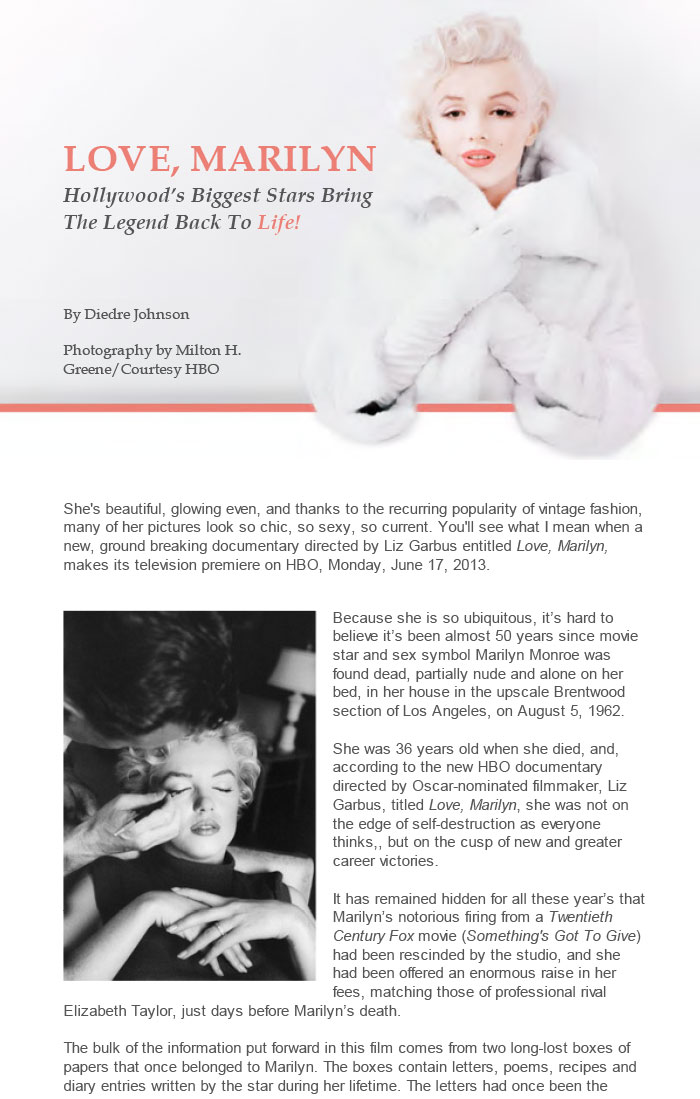
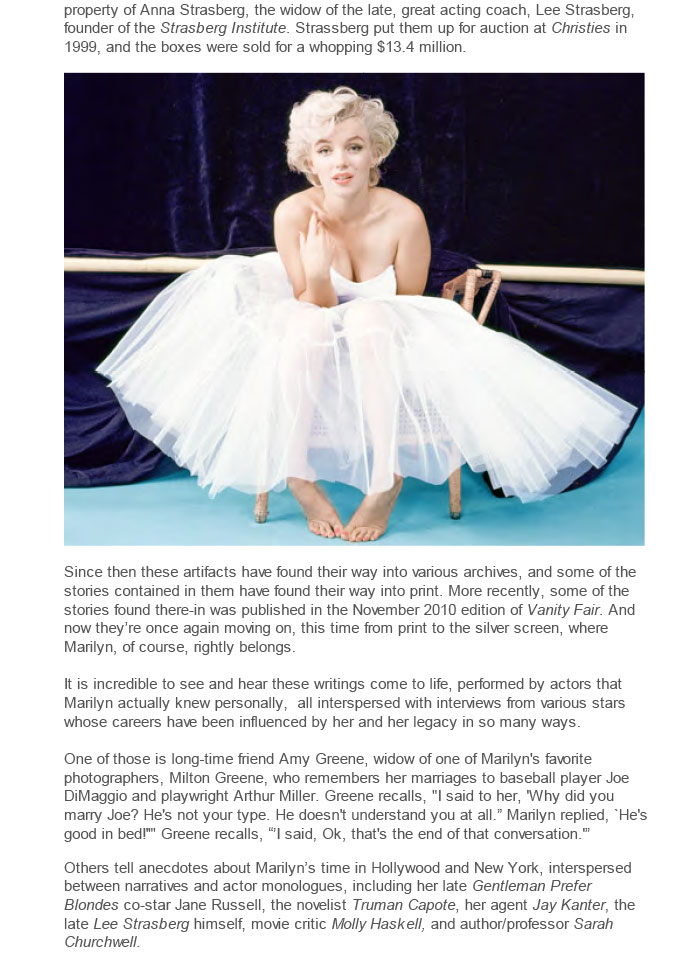
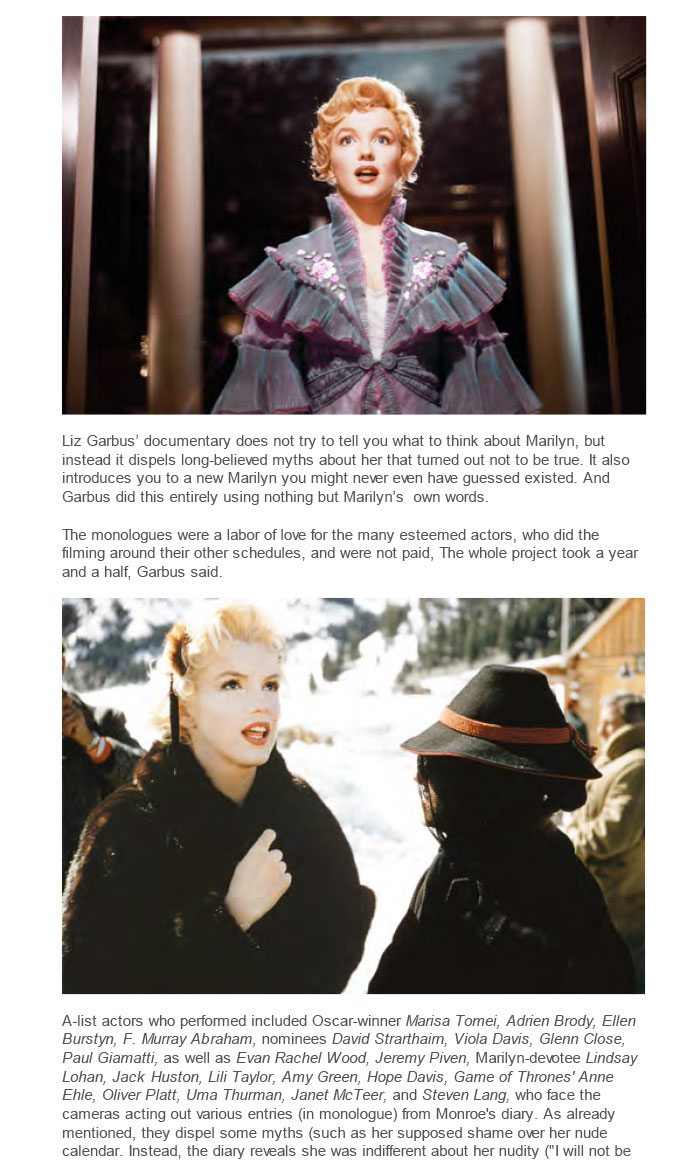

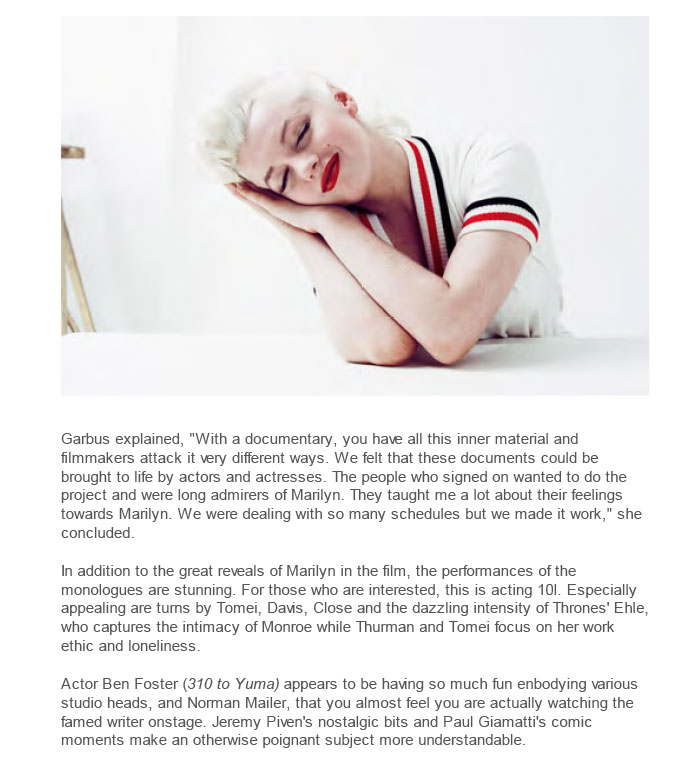
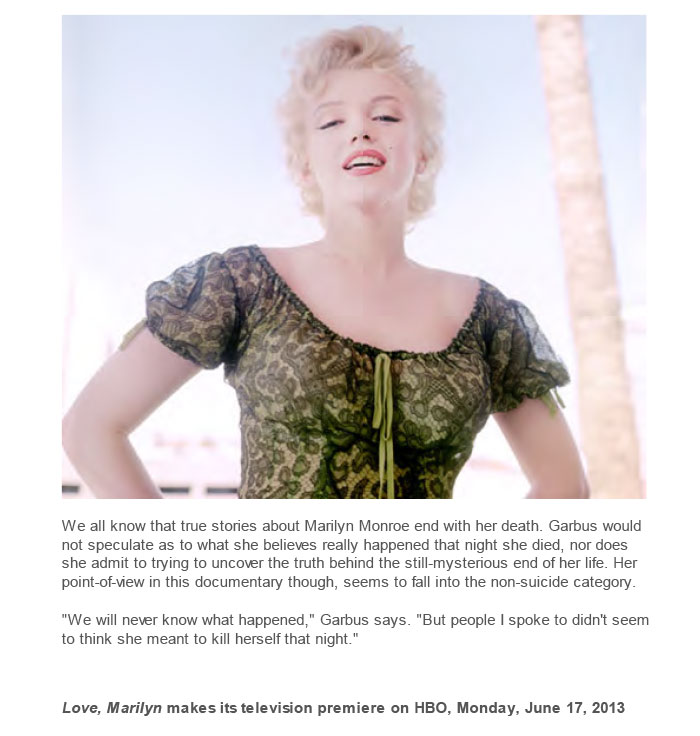
Leave a Reply